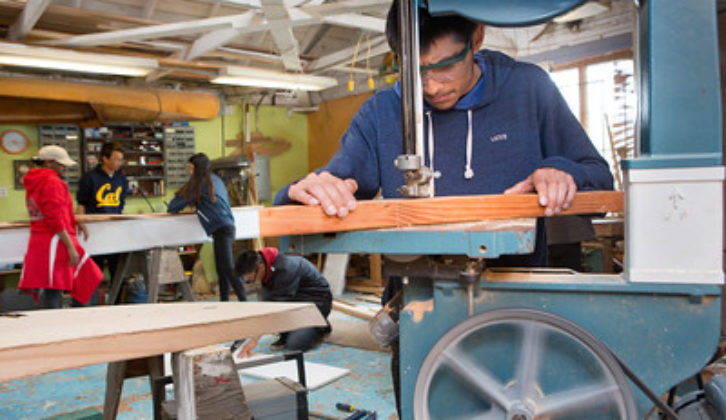
Many long-held beliefs in our schooling system are based on skinny and outdated proof but have profound — usually detrimental — impacts on the lives and psyches of our college students. One that actually bothers me? That we, as educators, are supposed to arrange college students for school or profession, when everyone knows that the skilled trajectory for almost all of our college students will lead them throughout each paths. We do a disservice to them after we suggest one has inherently extra worth than the opposite. We want stigma-free CTE.
Working in manufacturing and the commerce industries right this moment will not be the identical because it was 10, 20 or 50 years in the past. The scholars who will fill these jobs have to be adaptive problem-solvers who’re fast on their toes. They’ll want to have the ability to collaborate with various units of coworkers, a few of whom could also be situated midway around the globe. These will not be low-skilled jobs; in truth, fairly the other.
From vocational schooling to CTE

Sorting “vocational college students” from “pre-collegiate college students” is an extremely enduring function of our public colleges. The Smith-Hughes Act of 1917, the legislation that first licensed federal funding for vocational schooling in American colleges, explicitly made the excellence that vocational schooling was for college kids who wouldn’t be acquiring a university diploma. Debates raged within the early 1900s about how a lot Greek and Latin ought to be infused into the curriculum versus extra sensible and utilitarian expertise. In 1908, then-President Teddy Roosevelt said that public schooling ought to be “directing girls and boys again to the farm and store.”
So, this concept that college students are offered with an both/or state of affairs is firmly rooted within the twentieth century. However that is the twenty first century, and we actually have to have a extra holistic view of what college students have to be profitable in life and guarantee stigma-free CTE.
Staff don’t keep in the identical job, on the identical firm, doing the identical issues day in and day trip, till they retire. They could take a promotion or make a lateral transfer inside their {industry} or change industries altogether. It’s time we rethink the legacy of our schooling system that’s nonetheless calibrated to rank and kind college students into linear, predictable job paths and as a substitute take into consideration how we will educate and assess mastery of extra transversal expertise.
I work for a Board of Cooperative Academic Companies that’s consistently mapping expertise and asking the employers in our neighborhood who’ve jobs to supply what they assume a younger skilled of their group must know. Their suggestions is fairly constant. We not often hear issues like “Please educate them easy methods to function this one type of machine.” As an alternative, they need workers with delicate expertise, resembling the power to unravel issues, collaborate nicely with others, talk successfully, be leaders, be inventive, entry a number of literacies, be globally competent and be self-directed. They need them to have expertise that may translate to a number of jobs inside an {industry} or vocation.
Present school trajectories aren’t working
Conventional school trajectories do work for some folks, and a few fields require intensive classroom coaching that solely is sensible in a college setting. But when we take a look at the previous decade and the rise of the data economic system, what number of of these jobs truly require a standard four-year diploma program?
A survey of freelance staff with four-year diploma exhibits that 21% say their school schooling isn’t helpful to the work they do now. And whereas 21% could not appear alarming out of hand, the truth that within the subsequent 5 years freelancers will make up a majority of staff within the US economic system, it’s in all probability price taking note of.
Because of this it’s crucial that we offer publicity to profession, technical and vocational alternatives earlier on so college students can have important studying experiences by visiting native industries and companies in their very own communities. Many college students are pursuing careers with out ever having talked to somebody working within the subject, leaving them with little to no thought if they’re a great match for the job or if it’s a great match for them.
College students deserve publicity to the people who find themselves truly using staff domestically: publicity to their experience, to the character of the work out there of their neighborhood and to the varieties of challenges {industry} leaders of their neighborhood are attempting to unravel.
Which may occur by way of a partnership with a corporation like a BOCES, or it’d require districts to leverage partnerships with neighborhood teams, chambers of commerce and companies. It’s my expertise that the folks in our communities who’ve jobs to fill additionally are typically altruistically in interacting with the children of their neighborhoods and serving to to form native workforce growth.
Make CTE rigorous, participating and for everybody
Once I ask my very own 14-year-old daughter what she’s studying in her conventional college, she’s not in a position to inform me. She will be able to inform me about her worksheets, her assignments and her books. If I ask a 14-year-old in our stigma-free CTE applications, she not solely can present me what she’s engaged on but additionally the important query she’s attempting to reply, her opinion on what these solutions is perhaps and why the work is essential to somebody apart from herself.
Vocational schooling may be rigorous and fascinating, and it may possibly encourage college students to collaborate and construct real-world relationships with future employers and neighborhood members. In truth, many extra college students would thrive and our workforce could be extra distinctive if we eliminated the stigma from CTE and inspired extra college students to discover it as an possibility as early as potential.

